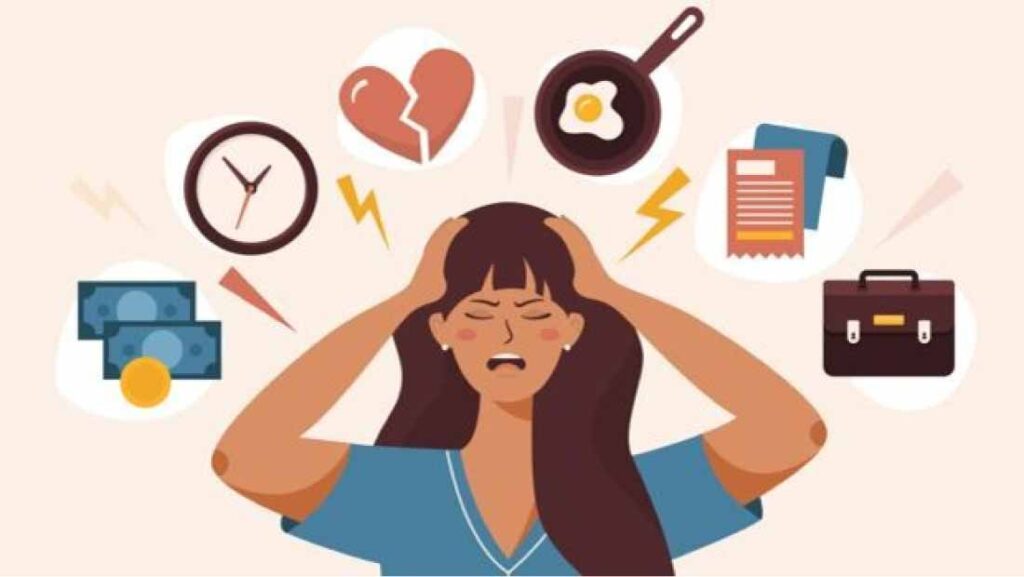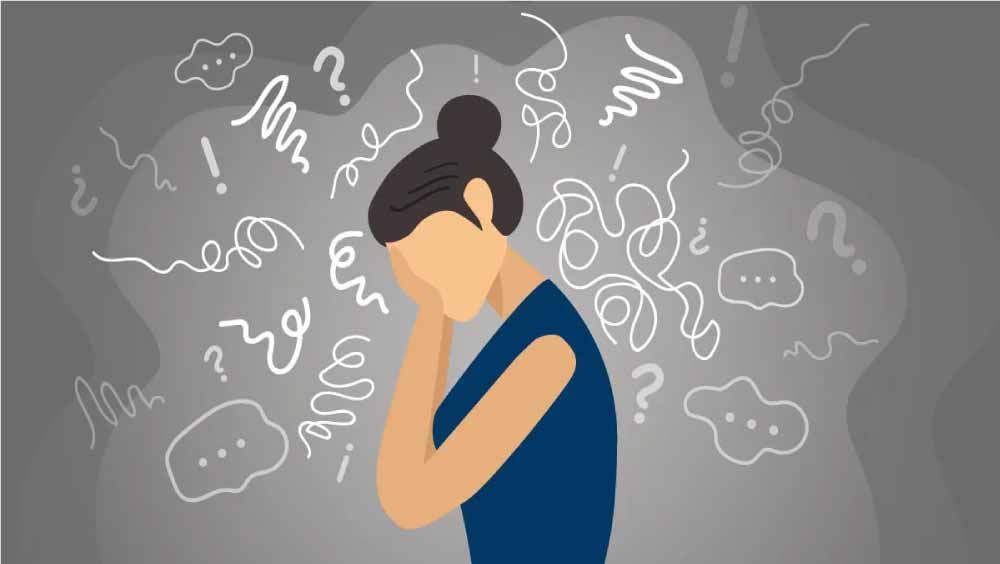Stress is the body’s natural response to challenging situations. However, chronic stress can have a negative impact on our physical and mental health. In this article, we’ll explore effective techniques for managing stress and improving overall well-being.
Identification of sources of stress
Identifying the sources of stress is a critical step in addressing this problem and developing effective stress management strategies. Here are some guidelines for identifying sources of stress in your life:
Emotional self-assessment
Reflect on your daily emotions and thoughts. Identify the times when you feel most tense, anxious or overwhelmed. These situations can be indicative of sources of stress.
Triggering events
Pay attention to specific events or situations that generate a negative reaction. They can be work, academic, family or social situations that trigger stress.
Physical and emotional symptoms
Observe how your body reacts to stressful situations. Headaches, digestive problems, irritability or changes in appetite can be indicators of stress.
Thought patterns
Identify negative or catastrophic thought patterns that can increase your stress level. These may include constant worries about the future or thoughts of excessive self-demand.
Changes in behavior
Notice if there are significant changes in your behavior, such as social isolation, procrastinating, or resorting to unhealthy habits to deal with stress.
Interpersonal relations
Assess how relationships with close people may be contributing to stress. Conflict or lack of support can be major sources of tension.
Workloads and responsibilities
Analyze your work, academic, and personal responsibilities to identify if you’re taking on too many tasks and if this is affecting your well-being.
Significant life changes
Events such as moves, job changes, losses, or major transitions can be significant sources of stress.
By identifying the sources of stress in your life, you’ll be better prepared to address them more effectively. It’s important to remember that stress is a personal experience, and what may be stressful for one person may not be stressful for another. So, take the time to reflect on your own experiences and needs to develop a stress management plan that’s right for you.
Mindfulness practice
The practice of mindfulness, also known as mindfulness, is a technique that helps us to be fully present in the current moment, without judging the thoughts or emotions that arise. By practicing mindfulness, we cultivate a greater awareness of ourselves and the environment around us, which can be very helpful in managing stress. Here’s how to incorporate mindfulness into your life:
Mindfulness meditation
Take a few minutes a day to sit in a quiet place, close your eyes and focus on your breathing. Watch as air moves in and out of your body, and if your mind gets distracted, simply gently bring your attention back to the breath.
Mindfulness exercises in motion
You can practice mindfulness while walking, running, or doing everyday activities. Pay attention to every step you take, how the ground feels under your feet or how the air caresses your skin.
Awareness of the senses
Take a moment to pay attention to your senses. Observe the sounds you hear, the smells you perceive, the tastes you experience, and the physical sensations you feel in your body.
Mindfulness in Nutrition
When eating, focus on the taste, texture, and aroma of the food. Eat slowly and enjoy every bite without distractions.
Body scanning practice
Sit or lie down comfortably and bring your attention to different parts of your body, noticing any sensations of tension or relaxation. This helps you connect with your physical sensations and release built-up tensions.
Observation of thoughts and emotions
Accept your thoughts and emotions as they are, without judging them. Recognize that thoughts and emotions are passing events and do not define your identity.
Gratitude and appreciation
Practice gratitude by focusing on the positive things in your life. You can keep a gratitude journal, writing down three things you feel grateful for each day.
Remember that practicing mindfulness takes time and patience. Don’t be discouraged if you find it difficult to stay focused at first. With regular practice, you will notice how you develop a greater ability to handle stress and more fully enjoy the present.
In addition, mindfulness is not a one-size-fits-all solution, and can be supplemented with other stress management techniques to create a holistic approach to mental and emotional well-being.
Regular exercise
Regular exercise is a powerful tool for stress management and improving physical and mental well-being. When we move and perform physical activity constantly, our body releases endorphins, neurotransmitters that generate a sense of well-being and reduce the perception of pain. Here’s how regular exercise can help you manage stress:
1. Release of tensions
During exercise, the muscles are activated and the accumulated tensions in the body due to stress are released. This can reduce the feeling of stiffness and improve muscle relaxation.
2. Cortisol reduction
Regular exercise helps reduce levels of cortisol, the stress hormone, which decreases the body’s physiological response to stressful situations.
3. Improved sleep
Exercising can contribute to better sleep quality, which in turn helps you cope with stress more effectively.
4. Increased self-esteem
Regular physical activity can boost self-esteem and self-confidence, which strengthens the ability to cope with challenges and stressful situations.
5. Focus and positive distraction
Exercise can act as a positive distraction from problems and worries, allowing you to focus on the present moment and free your mind from accumulated stress.
6. Fostering social relations
Exercising in groups or classes can provide an opportunity to make social connections, which in turn contributes to greater emotional support and stress reduction.
7. Sense of accomplishment
By setting and achieving goals in the realm of exercise, a sense of accomplishment and empowerment can be experienced, which improves overall well-being.
It’s important to find a type of exercise you enjoy to maintain long-term motivation. It can be any physical activity you enjoy, such as walking, running, swimming, yoga, biking, or team sports. The key is to incorporate regular exercise into your routine and fit it into your lifestyle.
It is always advisable to consult with a healthcare professional before starting any exercise program, especially if you have pre-existing medical conditions. Remember that the key is consistency and finding a physical activity that helps you maintain an emotional and physical balance to face stress in a positive way.
Relaxation techniques
Relaxation techniques are effective tools for calming the mind and body, reducing muscle tension, and coping with stress more serenely. Here are some relaxation techniques you can try:
1. Deep breathing
Deep breathing is a simple but powerful technique. Sit or lie down in a quiet place, place one hand on your abdomen and one on your chest. Inhale slowly through your nose, feeling your abdomen expand. Exhale gently through your mouth. Repeat this process several times, focusing on the sensation of breathing.
2. Meditation
Meditation is a practice that helps you focus your mind and release stressful thoughts. You can meditate by focusing on an object, a word, or simply the breath. Take a few minutes a day to meditate and you will notice its benefits in your well-being.
3. Yoga
Yoga combines gentle movements with breathing techniques and meditation. Practicing yoga on a regular basis helps reduce stress, improve flexibility, and promote emotional balance.
4. Massage or self-massage
Massages can be very relaxing for the body and mind. If you can’t access a professional massage, you can try self-massage on tense areas such as the neck, shoulders or hands.
5. Guided imagery
Close your eyes and visualize a quiet, relaxing place, such as a beach, forest, or garden. Imagine the details, sounds and sensations, allowing you to immerse yourself in that peaceful environment.
6. Listen to relaxing music
Listening to soothing, soothing music can have a calming effect on the mind and body. Create a playlist with your favorite songs for moments of relaxation.
7. Relaxing baths
A bath with warm water and bath salts can be a great way to relax and release muscle tension. Take advantage of this time to disconnect and enjoy the moment.
8. Mindfulness in daily life
Practice mindfulness in everyday activities, such as eating, washing dishes, or walking. Pay attention to every action, savoring the present and freeing the mind from worries.
It is important to remember that each person can find relaxation techniques that best suit their needs and preferences. The most effective is to try different techniques and see which ones give you greater relief and well-being. Incorporate these relaxation techniques into your daily routine to face stress with greater calm and emotional balance.
Setting boundaries and priorities
Setting boundaries and priorities is essential to maintaining balance in our lives and reducing stress. Here are some strategies to achieve this:
1. Identify your values and goals
Reflect on what is most important to you in life. Identifying your values will help you set clear priorities and make decisions more aligned with your goals.
2. Learn to say “no”
Recognize that you can’t cover everything and that saying “no” respectfully and assertively is necessary to protect your time and energy. Setting limits on your commitments will allow you to focus on what really matters.
3. Define personal boundaries
Set clear boundaries in your interpersonal relationships and work environment. Communicate your needs and expectations to make sure others understand and respect them.
4. Prioritize tasks
Use organizational techniques like to-do lists and agendas to prioritize what’s most important and avoid feeling overwhelmed by the amount of backlogging.
5. Establish work and rest schedules
Define specific times for your work activities and be sure to include time for rest, recreation, and self-care.
6. Avoid perfectionism
Accept that it’s normal to make mistakes and that perfectionism can lead to unnecessary stress. Focus on doing the best you can instead of seeking absolute perfection.
7. Eliminate non-essential activities
Identify activities or commitments that don’t add significant value to your life and consider eliminating them to free up time and energy.
8. Set technological boundaries
Limit the time you spend on electronic devices and social media to avoid distractions and spend more time on meaningful activities.
Remember that setting boundaries and priorities doesn’t mean being inflexible, but rather being aware of your own needs and capabilities. Learning to set boundaries and say “yes” to what really matters to you will help you maintain a more balanced and fulfilling life. In addition, this will allow you to focus on what is most relevant to you and find greater satisfaction and meaning in your daily activities.
Promotion of social relations
The promotion of social relationships is a fundamental aspect of emotional well-being and stress management. Social connections give us emotional support, help us reduce feelings of loneliness, and allow us to share experiences and emotions. Here are some ways to foster social relationships:
1. Keep in touch with friends and family
Make an effort to keep in touch with the important people in your life, whether it’s through phone calls, text messages, or video calls.
2. Participate in social activities
Get involved in activities and social events that interest you. Join groups or clubs that share your passions and hobbies to meet people with similar interests.
3. Practice active listening
When you meet friends or family, show genuine interest in what they have to say. Active listening strengthens emotional bonds and helps you better understand others.
4. Be kind and empathetic
Practice kindness and empathy in your social interactions. Being understanding and showing emotional support can make a big difference in the lives of others and your own.
5. Participate in group activities
Join classes, workshops, or events where you can interact with new people and make meaningful connections.
6. Volunteering
Participating in volunteer activities gives you the opportunity to meet people committed to similar causes and allows you to contribute to the community in meaningful ways.
7. Host social gatherings
Invite your friends or co-workers to social activities, such as dinners, outdoor outings, or board games. Social interaction in a relaxed environment can be very enriching.
8. Use social media consciously
Social media can be a useful tool for keeping in touch, but it can also be a source of stress if not used properly. Be selective with your connections and avoid constantly comparing yourself to others.
Remember that the quality of social relationships is more important than quantity. Cultivating meaningful and authentic relationships will provide you with valuable emotional support and contribute positively to your overall well-being. Take the time to nurture your social relationships and enjoy the benefits these connections can bring to your life.
Time for self-care
Time for self-care is essential to maintaining good mental and emotional health. Taking time to take care of ourselves allows us to recharge, reduce stress, and improve our ability to cope with daily challenges. Here are some ways to incorporate self-care into your life:
1. Set moments for yourself
Reserve time in your schedule for activities that bring you pleasure and relaxation. It can be reading a book, taking a relaxing bath, listening to music, practicing a hobby or just enjoying a quiet moment.
2. Prioritize sleep
Make sure you get enough sleep and maintain a regular sleep schedule. Adequate rest is essential to restore energy and improve mood.
3. Proper nutrition
Pay attention to your diet and make sure to include a balanced and nutritious diet. Eating healthy contributes to your physical and emotional well-being.
4. Regular exercise
As we mentioned earlier, regular exercise is an effective form of self-care. Find a physical activity you enjoy and enjoy it regularly.
5. Mindfulness practice
Dedicate time to mindfulness practice to connect with yourself and reduce stress. Meditating or simply spending time in nature can be a great way to achieve this.
6. Set boundaries and learn to say “no”
Learn to recognize your own limits and don’t feel guilty about saying “no” to commitments that can overload you.
7. Seek emotional support
Share your feelings and concerns with close friends or family you trust. Having a support system can be comforting and liberating.
8. Disconnect from screens
Take time to disconnect from electronic devices and social media. This will allow you to relax and connect with yourself more deeply.
Remember that self-care is not a luxury, but a necessity to maintain an emotional balance and a healthy life. Take the time to take care of yourself and prioritize your well-being. By doing so, you’ll be better prepared to face life’s challenges with a clearer mind and a more resilient spirit.
Avoid perfectionism
Avoiding perfectionism is key to reducing stress and improving mental health. Perfectionism is a tendency to set excessively high standards and be extremely self-critical. Here are some strategies to overcome perfectionism:
1. Accept imperfection
Recognize that no one is perfect and that it’s okay to make mistakes. Learn to accept your imperfections and understand that they are a natural part of being human.
2. Celebrate achievements
Instead of focusing on what you didn’t accomplish, recognize and celebrate your accomplishments, no matter how small. Appreciate your efforts and progress instead of focusing solely on what you didn’t deliver.
3. Set realistic goals
Define achievable and reasonable goals. Setting unattainable goals will only increase stress and feelings of dissatisfaction.
4. Learn from failure
Instead of seeing failure as a defeat, consider it an opportunity to learn and improve. Mistakes are opportunities to grow and develop.
5. Stop comparing yourself to others
Avoid constantly comparing yourself to others, as this can fuel perfectionism. Remember that each person has their own unique path and circumstances.
6. Practice self-compassion
Treat yourself with kindness and compassion. Instead of judging yourself harshly, be kind to yourself as you would be to a friend facing challenges.
7. Learn to delegate
If you tend to want to control everything, learn to delegate tasks and trust others. Recognize that you can’t do everything and that it’s okay to ask for help.
8. Focus on the process
Instead of obsessing over the end result, enjoy the process and learn from every step you take toward your goals.
Overcoming perfectionism takes practice and patience. Don’t be discouraged if you initially find it difficult to change this trend. With time and perseverance, you can break free from perfectionism and experience greater freedom and emotional well-being. Remember that the goal is not to be perfect, but to find a balance that allows you to live a full and happy life.
Conclusion of Stress
Stress management is an essential skill for a balanced and healthy life. By incorporating these techniques into our daily routine, we can strengthen our resilience and face challenges more effectively. Remember that each person is unique, and it is important to find the strategies that best suit our individual needs.


